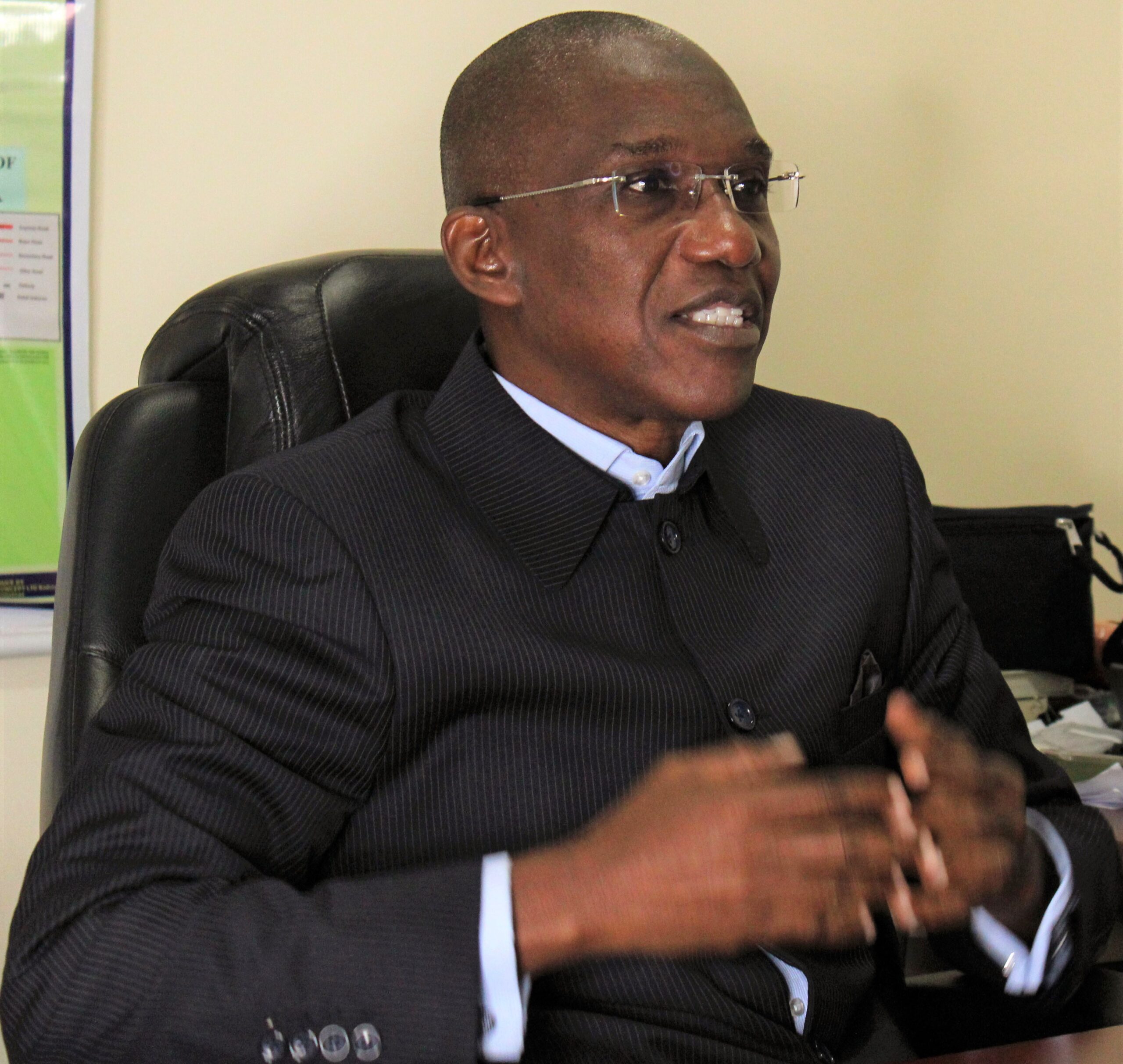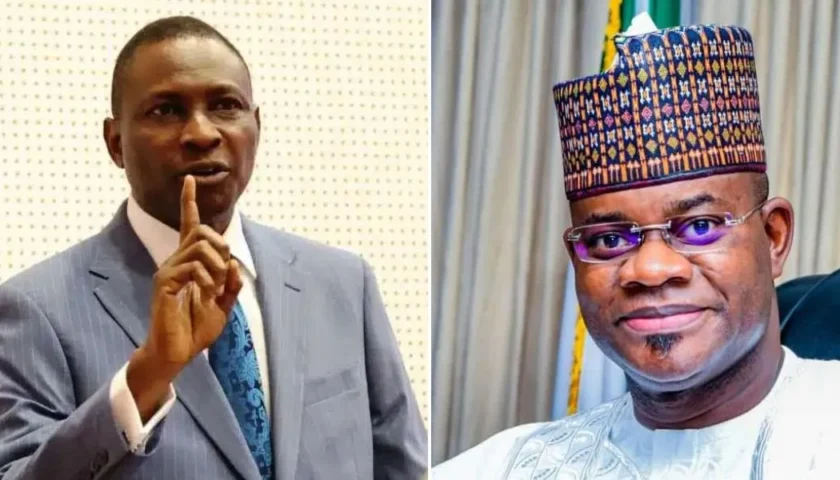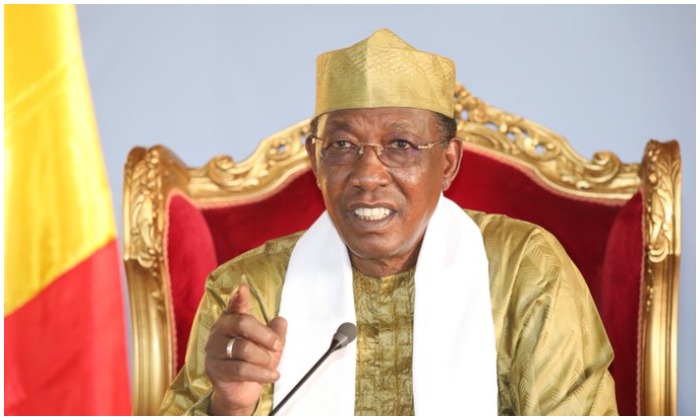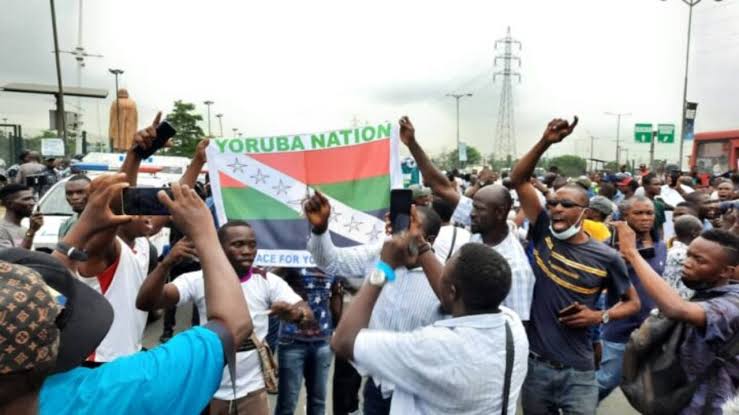Managing Director/CEO of AMCON Mr Ahmed Kuru making a point during the interview last week in Lagos
Ahmed Lawan Kuru the incumbent Managing Director/Chief Executive Officer of the Asset Management Corporation of Nigeria (AMCON), who is fondly known as ALK by friends, cronies and admirers is a career banker with professional experience spanning nearly four decades across Investment Banking, Risk Management, Operations, Human Capital Management and Marketing amongst others. Prior to his appointment at AMCON by President Muhammadu Buhari in August of 2015, he served as the Managing Director/CEO of erstwhile Enterprise Bank Limited. His ingenuity at turning the then stressed bank around and returning it to profitability within the first year at the helm earned him the famous name in the financial sector as the turn-around-agent.
On arrival at AMCON, the Borno State-born technocrat was confronted with another sort of challenge – to recover a humongous debt obligation of over N5 trillion owed Nigeria by a few individuals who wrecked some banks and rendered millions jobless. Kuru and his team hit the ground running and has shown no fear in confronting the rich, powerful, and mighty that are indebted to AMCON. Taking off from where the previous Management left off, they knew that the new assignment required a different approach, which was why they introduced some far-reaching resolution strategy, which increased the tempo of recoveries and tactically refocused AMCON on value enhanced exit of its portfolios.
Even though they are empowered with the amended AMCON Act, Kuru did not see enforcement as first option in the recovery effort. He allows enforcement action on any obligor after the collapse of all avenues of peaceful resolution. His leadership methodology and teamwork at the government agency has led to the repositioning of AMCON’s debt recovery approach, which has strengthened the Corporation to collaborate and perform more efficiently with asset tracing engagements to enable AMCON to recover much more. As a result of this, AMCON was able to successfully divest 100 per cent of its equity holding in its bridged banks, and recently acquired Polaris Bank Limited (formerly Skye Bank Plc), which is now being repositioned for sale.
AMCON also saved Arik Airlines (the largest local carrier) and Aero Contractors (the oldest carrier) from shutting down operations at the nick of time, among others. Before ALK arrived AMCON, he previously served as Managing Director/CEO of erstwhile Enterprise Bank Limited; Executive Vice Chairman, Emeritus Capital Limited; Executive Director of the old Bank PHB Plc. and held very senior management roles at Habib Bank of Nigeria. ALK attended the prestigious Ahmadu Bello University (ABU), Zaria where he obtained degrees in Business Administration as well as MBA. He has attended various international programmes including IMB, Switzerland, the London Business School, Columbia Business School, New York, Insead Paris, as well as Harvard Business School.
He has served on the Board of over 30 organisations and is currently playing key roles in several other organisations. He is an experienced corporate executive with proven leadership attributes, a community builder, motivational speaker, an orator, and a mentor. Passionate as he is, Kuru who was recently reappointed by President Muhammadu Buhari for a second and final term of five years as AMCON MD/CEO is a Fellow of both the Chartered Institute of Credit Administration, the Chartered Institute of Bankers Nigeria (CIBN), Institute of Public Administrators of Nigeria and Institute of Directors (IoD), just to mention a few. Looking back at his first five years as AMCON boss, he spoke with the media recently on what it means to be CEO of AMCON and other sundry matters… Excerpts.
First of all, accept our heartfelt congratulations, for completing your first five years as AMCON MD/CEO and your reappointment for a second and final term of five years by President Muhammadu Buhari. This also coincides with a decade of existence of the Corporation. These, without any doubt, are great achievements.
Thank you so much. The media has been there for us too as reliable partners in progress and please note that we do not take that sort of support for granted. We are very appreciative of the support.
You have been in the saddle now in the past five years and about to start another term in office but, stakeholders, keen observers and of course the public, would like to hear from you if the economic rationale behind the enactment of the AMCON Act and the subsequent establishment of the Corporation have been justified?
Yes, the rationale behind the enactment of the AMCON Act and subsequent establishment of the Corporation have been justified. Recall, prior the establishment of the Corporation, Nigerian economy was in a dire state. There were foreign portfolio withdrawals of credit lines & investment from Nigeria; the stock market also collapsed leading to loss of about 80% of its value and the Banking Industry crisis deepened due to poor risk management that led to increase in the Non-Performing Loans (NPLs) of the banks as a percentage of industry loans. At a point in 2009 NPLs as percentage of all bank loans was as high as about 37.25%. I salute the courage and the wisdom of the Central Bank of Nigeria (CBN) for quickly intervening by proposing to the National Assembly the need to set up an Asset Management Corporation to stabilise the economy, which was the global trend at that time.
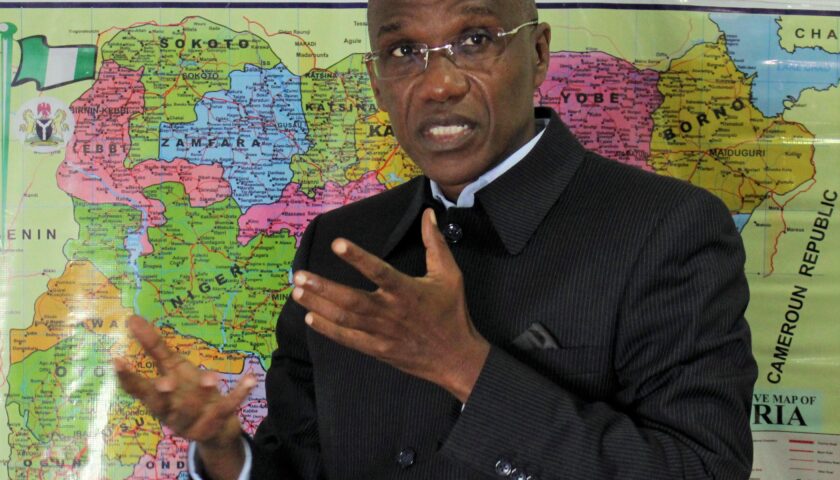
Could you, please, share with us the success of AMCON thus far – from its establishment till date towards executing its constitutional mandate as specified in the Act establishing the Corporation?
Like I said, setting up AMCON is a blessing to the economy of this great country. Despite the lingering economic challenges and deliberate tactics of some recalcitrant obligors, the Corporation has recorded quite a lot of successes. In the first place, we supported so many businesses immediately after the global economic crisis. Some of them are doing well now. The financial institutions were equally supported to avoid a systemic collapse. Some banks are operating today due to AMCON’s intervention in the industry. In terms of recoveries, so far, we have made a total recovery of above N1.2trn. we have sold assets worth about N500bn and have resolved close to 5000 Eligible Bank Assets (EBSs). The Corporation has paid over N2trn to the CBN. The fundamental objectives for the establishment of AMCON was to—rescue commercial banks and some underlying strategic businesses in Nigeria from the brink of collapse in the aftermath of the global financial crises of 2008 through acquisition of non-performing loans and to dispose of the underlying assets in the most profitable manner. AMCON also had the mandate to recapitalize the banks and to recover the debts using the various resolutions mechanisms created under the Act, which without mincing words I can tell you have been executed effectively. As at today, AMCON has achieved the first mandate of purchasing the Non-performing Loans (NPLs) and providing liquidity to the commercial banks. We are currently focused on the second and most difficult phase of recovery and restructuring of the bad loans. Recall that AMCON acquired over 12,000 NPLs worth N3.7 trillion from 22 banks and injected N2.2 trillion as financial accommodation to 10 banks in order to prevent systemic failure. As a result of this intervention our current liability with CBN is around N4.7trillion while the sum of N2trillion had been repaid so far.
In the area of supporting businesses, AMCON has also done very well especially in the aviation and manufacturing sectors. Our intervention efforts in Arik Air with the support and collaboration of the Federal Government did a great service to the growth of the sector. A similar intervention in Aero Contractors also saved the airline from collapse. As a matter of fact, the Nigerian Civil Aviation Authority (NCAA) certified Aero, which is under AMCON receivership to commence C-check maintenance services on Boeing series in Nigeria. This is a commendable feat in Nigeria’s aviation industry and there are several other companies that we have saved.
Again, in an attempt to focus our resources on the recovery mandate, we have identified about 6,000 loans with outstanding balances below N100million, which constitute only 20% of our current portfolio. This portfolio has been outsourced to debt recovery agents under the Asset Management Partners (AMP) scheme, which has created huge employment opportunity for others. This has enabled the Corporation to focus on fewer accounts, which make up 80% of the portfolio. In our reckoning, if AMCON is able to resolve the nearly 2000 accounts it would have achieved more than 80% of its recovery mandate. In line with our sunset period, we are tinkering with the idea of increasing the threshold of the AMP scheme to N1billion. We have also classified 350 accounts with current exposure of over N3.2trillion into a category referred to as Criticized Assets.
We consider the resolution of these accounts to be germane to the success of AMCON’s recovery mandate. We give special attention to these accounts at top management level and develop strategies for resolving them. The largest concentration is in the energy sector, which constitutes 27%. As we have always stated, one of the major challenges to AMCON’s recovery mandate is the slow pace of our judicial processes. However, we have continued to engage with the judiciary, and we believe that there is now greater awareness about the role of AMCON amongst the Judges at the trial courts as well the Justices of the appellate courts and they have been supportive. Just as it is with the judiciary, the media have come to understand that AMCON is fighting for the good of all Nigerians because recovery of these monies and its judicious application to the Nigeria economy will improve critical infrastructure such as roads, rail lines, security, power generation and distribution, mass housing and a whole lot of others. That is what we have been doing in a nutshell.
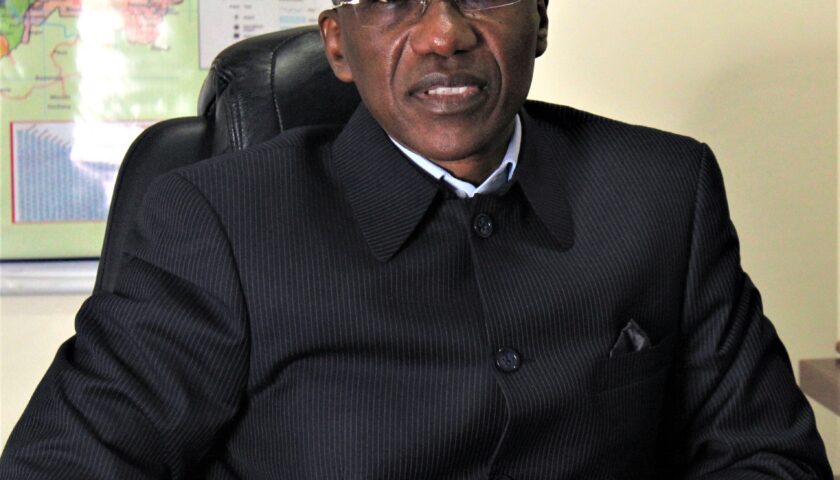
On assumption of office as MD/CEO of AMCON, what did you meet on ground in terms of structure and processes?
For me no matter the process of any organisation, be it the systems, technology and people, the most important for me is the human capital that we met on ground. So, I will look at this question from that perspective. We met a team of workers who are dedicated, enthusiastic and ready to serve the nation by helping in restructuring of accounts and in the recovering of debts owed to the country by a few individuals. We saw the progress by previous Management and by laying solid foundation to build on.
The next critical economic growth driver where we paid so much attention is technology. Again, as you know, technology accounts for much of the economic and social progress of the past few centuries. The rate of technological progress influences economic growth and so we paid serious attention to that. Looking at what happened with the dawn of the dreaded Coronavirus (COVID-19) pandemic, I can tell you that AMCON was one of the leading government agencies that did not gasp for air when organisations had to work from home as a result of the COVID-19 shut down. It was seamless for us during the period as our staff worked from home. We had our regular meetings and carried out our operational activities as if we were operating from our offices. Much later, we also changed the approach to more of enforcement from the older approach of negotiation and restructuring. We had to do that because the previous management dealt with the low-hanging fruits so to speak. Most of the debts we met on ground were hard-core, which required a new approach if they are to be realised. Therefore, we had a change in strategy, given the fact that we are fast approaching our sunset period, without any luxury of time. Therefore, we met a good structure on ground, which we built on.
The management you took over from played key role in the amendment of the AMCON Act as amended in 2015, which was just about the time Mr. President appointed your team. But you led the 2019 amendment. What would you say led to this second request that led to the amendment of the AMCON act again?
First, I must underscore the fact that it is not unusual to periodically review or amend the law that governs activities of any organisation. I am sure you have heard some complaints and concerns about even the Nigerian constitution and so on. No such document created by man is perfect so, the AMCON Act in itself was also not a perfect document. Those who drafted the Act knew that a time would come when there would be need for a review. AMCON obligors are tricky and are constantly trying to avoid, circumvent and totally deny commitments and obligations.
In the course of trying to recover, we encounter several challenges and one of the greatest challenges we have encountered overtime is through the instrumentality of the courts. AMCON obligors know fully well that the Corporation has a sunset date, so they get wiser by the day; deliberately hiding under the technicalities of the law to cause orchestrated legal delays. When you find yourself in that situation, what do you do as a government? Therefore, the Act was amended first in 2015 to address some of the encountered challenges, which the 2015 amendment thoroughly addressed. That done, the obligors changed to other tactics, which again necessitating another amendment in 2019. We are therefore grateful to President Muhammadu Buhari for signing it into law soon as it was presented to him by the National Assembly.
What is your major concern with your recovery efforts and approaching sunset time?
The whole objective of the government is to enable AMCON recover the loans bought from banks in order to settle our debt without recourse to taxpayer’s money, which is over N5trillion as we speak. This is not the sort of additional burden we should pass on to the federal government now when the government is over stretched with funding other critical areas of our national development. We are also lucky the National Assembly through its committees fully understand what we do and the kind of support we require from them and they are always ready and able to provide the support.
We fear that if at sunset AMCON is unable to recover the huge debt, it becomes the debt of the federal government of Nigeria for which taxpayers’ monies will be used to settle. The implication is that the public will be made to pay for the recklessness of only a few individuals who continue to take advantage of the loopholes in our laws to escape their moral and legal obligations to repay their debts. That is why our renewed strategy for recovery focuses more on enforcement. It has become clear to us that to attain the target as we approach sunset, we must redouble our efforts in the area of recovery. Interestingly, the AMCON Act anticipated a situation where we may need to enforce if negotiations fail. Negotiations have failed us and that is why you see more of AMCON enforcements in the news lately. It is the only way to bring these recalcitrant obligors to the table.
With all the efforts that you have put in place including naming and shaming of the heavy debtors, which at some points you tagged monsters, the series of asset takeovers that you have done yet some obligors have remained recalcitrant, what would you suggest to the government going forward especially in line with sunset?
We have said it severally that some of them borrowed the money from the banks with no intention to pay back, which was why we have been calling on the federal government to reconsider the reintroduction of the Failed Bank Act to make the operators also answerable. We shall continue to operate within the law and encourage that the debt obligations of the recalcitrant debtors follow them, whether in government employment or otherwise. It is not a bad thing to borrow money, but it is bad to avoid paying back. Government should not do business with those that cannot keep to commitment. We know things are hard, but commitment is commitment. At least, let us be talking and performing. We shall continue to pursue them through the instrumentality of the courts by being law abiding, although some of them want to avoid the law.
The enormous challenges that you faced led to you changing your recovery strategy at some point. Would you say that change in strategy has eased the challenges AMCON hitherto faced as well as improved your recovery mandate?
Our initial strategy was to negotiate with obligors, restructure and continue to wait on recovery. On some few cases, we even had to inject additional capital to support some of the businesses that are strategic to the economy. However, overtime we realised that such strategy will not work, and we may be unable to recover, given our sunset date. Let us not forget that some of these faulters had been with the banks for more than five to ten years before being transferred to AMCON. Meaning if you can add that to ten years of AMCON, talking can no longer solve the problem, after many failed promises. The only way forward is enforcement. Therefore, we had to change our operational strategy. This new strategy gives support to enforcement and puts the AMCON on a position of strength because we do not have the luxury of time.
Like I said earlier, all the low hanging fruits have been dealt with before we arrived leaving us with only the hardcore debts. It will interest you to know that we have been in court with some of the obligors for nearly ten years and we cannot continue to wait on their terms – mind you, some of them do not have any intention to pay back so you need some tinkering to force them to the table. Now, with the change in strategy, a lot is happening because we have made them uncomfortable just as we have made huge recoveries since we changed our strategy.
The present Management of AMCON under your leadership – is five years old and your performance apparently has led to your reappointment by President Muhammadu Buhari. What would you highlight as the high points of your stewardship as Managing Director/CEO?
Like I mentioned earlier, there is no amount of investment in human capital development that is too much. Within the period of our assignment here, we have groomed a good number of competent and capable workforce that can compete with their peers anywhere in the world as far as asset resolution management is concerned, which is very good for the economy of our great country. We cannot over emphasise that fact. Our highpoint is our ability to strengthen our human capital assets, resulting in putting in place a good and transparent structure that matches global standards and have tried to instill a culture of commitment to national service to fatherland particularly in our team of young and upcoming staff.
We have strengthened our human capital assets, which has resulted in putting in place a straight process on ground to ensure transparent means of dealing with our activities. This has resulted in higher recoveries and resolutions. On the business side, we have intervened in quite a lot of businesses, witnessing return and sustaining job security and enhancing economic activity. We supported the establishment of the first MRO in Nigeria by Aero. We have succeeded in sensitising our stakeholders, the judiciary, National Assembly, the public as to the importance of our national assignment. They have provided tremendous support to us.
Shortly after we assumed office, it was obvious that it would be difficult for AMCON to resolve the over 12,000 loans in our portfolio, so we came up with a scheme, which we christened Asset Management Partners (AMPs) to join us in the recovery drive. AMPs are consortiums with specialist skills required to ensure recovery and debt resolution, banking, legal, valuation and accounting. They began operations in May 2016 working together with AMCON to resolve the over six thousand accounts with loan balances of N100million and below, which we firmed out to them. The thinking behind the establishment of the AMP scheme was strategic – AMCON is the first of its kind in our clime so we needed to create a team of professionals that can continued from where AMCON stopped at sunset.
Any comparison between AMCON and similar institutions on the global stage and is there a different model of operation, which you would have opted for instead of the AMCON model?
Our model is unique giving the peculiar situation we found ourselves at that time. However, as the Corporation continues to restore the confidence in the financial system and indeed mindful of our sunset period, we needed to consider fine-tuning our approach/model and essentially, we considered a model close to the Korea Asset Management Corporation (KAMCO). There is no perfect model anywhere in the world. However, we have continued to strengthen our model given the peculiarity of Nigeria and the circumstances we find ourselves. The law setting up Asset Management Company is different in different locations. Our initial challenge has to do with the legal ownership of some of the assets. In other climes, that ownership was transferred with the enactment of the law. But here we have to go to the court because of the constitutional right of hearing. And also, the winding down laws are different. But we are working closely with our various stakeholders to ensure we focus on the objectives and protect public interest.
The Presidency set up what it called the Inter-agency Committee on AMCON to complement the efforts of your Corporation. Can you bring us up to speed with that committee and what it has done since it was set up?
On September 16, 2019 if I remember correctly, the Presidency graciously constituted a committee, which it christened ‘Inter-Agency Committee for the Recovery of AMCON Debts.’ The committee is comprised of eight key government agencies – Independent Corrupt Practices Commission (ICPC); Nigerian Financial Intelligence Unit (NFIU); AMCON; Nigeria Deposit Insurance Corporation (NDIC); Federal Ministry of Justice (FMoJ); Economics and Financial Crimes Commission (EFCC); the Central Bank of Nigeria (CBN) and the Department of State Services (DSS). The essence of the committee is basically to assist the corporation in its recovery efforts and pursue criminal lines where one exists. The chairman of the committee is the chairman of the ICPC. The committee is working seriously on identifying cases. A few strategic accounts are being reviewed by the Sub-Committee using an unconventional approach towards the recovery of the debts by preferring criminal charges against the obligors where criminal infractions have been identified.
As a result, the Sub-Committee will not limit its review to the antecedents of the loan transactions but will extend the review into other areas such as tax compliance, the CBN prudential guidelines, filing of returns at the Corporate Affairs Commission (CAC) and other regulatory compliance requirements, which the obligors may have violated. Overall, the Sub-Committee is focused on taking measures that will result in outright settlement or plea-bargain settlement between the obligors, the Federal Government and AMCON. The whole essence is to pay the debt and ensure non-occurrence of such malfeasance in the industry.
A lot of Nigerians do not envy your job because it involves chasing ‘bad people’ who took money from the system with no intention to pay back. But here is Ahmed breathing down their neck to pay, which automatically makes you their ‘enemy’. How have you been able to balance your sanity doing this difficult assignment?
I can tell you the assignment is not easy at all. As a recovery agency, our main objective is recovery from both distressed and also affluent members of the public. In both cases, it is a serious matter, particularly where enforcement is involved. But to the glory God Almighty we have continued to remain sane and humble. My personal approach to life is simple. I always say we are not only accountable to Mr. President, Muhammadu Buhari who found us worthy to serve in this capacity as members of a team, and even reappointed us for a second term, we are also accountable to Nigerians and the Almighty. But like you rightly said, I do not envy the job myself because as humane as we have been and as compassionate as we have tried to be in handling some obligors, they have continued to spew and sponsor all manners of campaigns of calumny against the management team under my leadership, but we are not deterred. My consolation is that we are not doing anything that is outside of our scope. Some of our obligors, unfortunately, instead of focusing on settling their obligations have taken the matters personal, very personal. But we put our trust in God.
Nigerians are full of harsh words each time they talk about the judicial processes in the country, but you have always said they (the judiciary) are trying their best. However, AMCON alone has well over 3,000 cases in different courts so why would you say they are trying?
We cannot overemphasise how important the role of the judiciary is to the success of AMCON. A lot of our work depend on the judiciary and therefore we understand the critical part they play in ensuring we recover government debt in the national interest. We trust that our judiciary would continue to assist in granting accelerated dates for AMCON cases so that these obligors do not take advantage of our sunset date to walk away from their debt obligations. We still have rule of law because of the strength and independence of the judiciary. We should all continue to support them to be stronger and independent. We are happy with their support and understanding of the AMCON Act. As Nigerians, we must support the judiciary.
COVID-19 is unarguably both a health crisis and an economic crisis, triggering a deeper global recession in 2020 and slower economic growth. Nigeria is part of the global economy, thus seriously affected. How does COVID-19 affect your operations and output?
Coronavirus pandemic has had a monumental impact on the globe and Nigeria in particular. Not only has it adversely affected the global economy, but the entire health system of the world has remained on its knees. AMCON, as one of the institutions of the federal government that is saddled with the responsibility of revitalising Nigeria’s economy is not immune to this monumental global disaster. We are hit like every other sister agency, or organisation but, we did not allow that to deter us. Even during the pandemic, we were making recoveries.
We have however taken drastic steps towards curtailing the spread of the pandemic as it relates to our workforce. As regards our business operations, we remain guided by the provisions of the Act (as Amended) and are mindful of our sunset date. We are also aware of the hardship caused by the pandemic on most businesses and indeed the economy at large, therefore the Corporation has been lenient towards deserving obligors that had hitherto shown commitment/seriousness towards resolving their indebtedness and we are complying with the COVID-19 protocols put in place by the government.
What are the lessons that you have learnt from the outbreak of COVID-19 as a Chief Executive Officer of a top government agency?
A lot. The outbreak of the coronavirus (COVID-19) exposed the deficiencies of every aspect of humanism not just in Nigeria but across the globe. Even some countries we hitherto thought are developed nations with all their sophistication were humbled because nobody envisaged this level of attack from the virus. The virus reaffirmed the fact that all powers belong to God Almighty. COVID-19 also underscored the family as the basis of our existence. If you recall, at the peak of the first wave of the lockdown in Nigeria and most countries around the world, we were all stuck with our immediate family units. We stayed away from friends, business associates, colleagues, school mates and everybody. The family became the centre of our whole existence.
COVID-19 rudely woke us up as a country to pay attention to critical infrastructure such as health facilities as well as regular electricity, telecommunications and so on and to be health conscious and considerate of others. For people to work from home, these facilities must be effective, efficient, regular, and affordable. As a business, COVID-19 has proved that we all need to invest more on technology and human capital development like I always say. We also have to put structures in place to protect staff from danger and ensure full compliance to the protocols. It also exposes the redundancies in the system.
AMCON was designed to last for a period of 10 years except if the National Assembly thinks otherwise. But if AMCON sunset comes and the Corporation is not able to resolve all the debts, what will be the next step forward?
AMCON is not designed to last 10 years, but the funding model was projected to last 10 years depending on the situation of the economy. However, this is situation we do not want. Unfortunately for us, we have reached a stage in the operations of the AMCON that our future successes and achievements most certainly depends on the strategy of the law & law enforcement and its application. Unfortunately for us, besides the effort of our staff, progress is dependent on third parties like the judiciary substantially and other agencies of government. It is on that basis we sought for the amendment of the AMCON Act hoping that the amendments will curtail frivolous tactics employed by recalcitrant obligors under our judicial system and improve our debt recovery efforts. If AMCON fails to recover the outstanding debt, the whole thing will be a burden to all of us. The National Assembly is there to support all the way to the end. They are conscious of the issues at stake and are supportive.
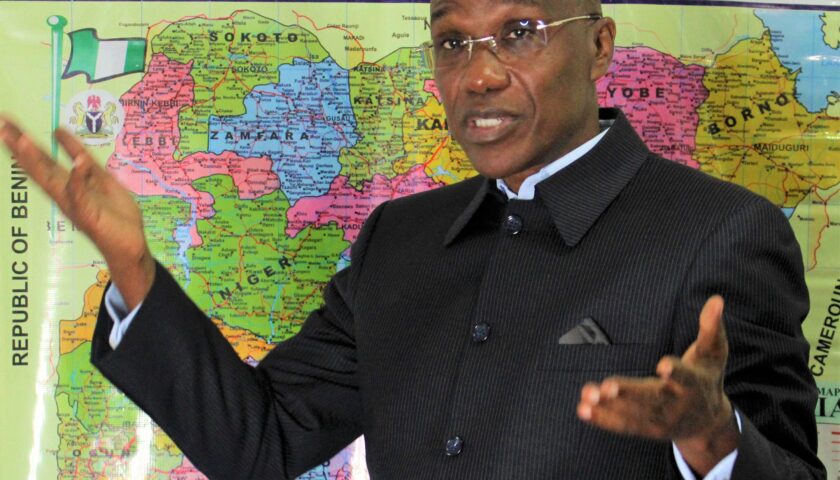
Knowing what you know now as CEO of this top agency, should Nigeria decide to toe this line in the future, what would be your advice to the Federal Government?
Simple. I will tell them to make the Act establishing any such AMC as strong as possible so that the obligors will not have that luxury of going to the court to tie the AMC down for years hiding under some legal technicalities and loopholes. I will advise that the government establish a special court that would deal with cases related to the AMC with dispatch. AMCON has cases that have dragged for more than 15 years, which is not good for the country because of the legal battles that we have had to fight and are still fighting. And the underlying collateral should be surrendered for easy disposal without going to court abinitio.
Is Ahmed Kuru thinking about writing his memoir sometimes soon?
No. There is nothing extraordinary about me to write about. I am just an ordinary person like most Nigerians, living an ordinary lifestyle.
Finally, Sir most CEO’s play gulf, some play football, others enjoy boat ride or polo etc as leisure. How does the man ALK relax when he is not chasing debtors? I like reading a lot of literature no matter the topic. I enjoy swimming, watching movies and a fan of good football, if it involves the Super Eagles of Nigeria and Arsenal. I love Arsenal because they play amazing football and, they can disappoint you when you least expect it like some of our obligors. I love family.


